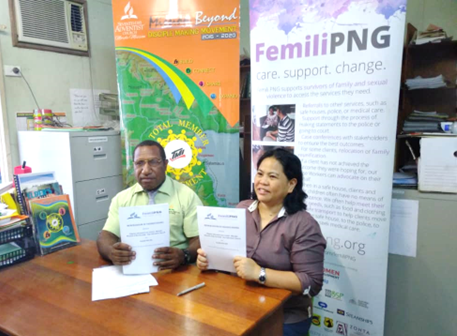Story by Jonica Jay
The Morobe Adventist Care Centre is a local community initiative that serve as a safe haven for survivors of violence seeking refuge. The safe house was officially opened on 5th June 2022 at the Morobe Mission of the Seventh-day Adventist (SDA) Hall at 2mile, and the dedication took place at the safe house site in Lae.

The provision of safe accommodation to survivors of family and sexual violence (FSV) has always been a challenge given the number of survivors compared to the limited number of safe houses operating in the province. Given the reality, Femili PNG CEO Ms. Daisy Plana had the vision to help in creating a safe place. A safe place where survivors can be empowered in making informed decisions, and have their needs addressed holistically. The quarterly donations of clothes, food and toiletries made by the Pilgrim SDA Church members for Femili PNG clients inspired Ms. Plana to initiate support in establishing a safe house. The land and fencing for the safe house were purchased through funds raised from Femili PNG staff and individuals who showed interest in supporting the initiative.
Through the initial support from Femili PNG with K60,000.00 worth of building materials, the construction of the safe house commenced in August 2020. The Pilgrim SDA Church took lead in the construction of the building; a group of dedicated young men who volunteered and were committed in completing the safe house. The same group whom at the same time, being involved in the construction of their new SDA church building. In 2021, the Pilgrim Adventist Care Centre was selected as one of the recipients of the Digicel Foundation’s Community Grants Program. In the same year, the Centre also received an additional funding and support from the Adventist Development and Relief Agency (ADRA), the SDA Morobe Mission, Femili PNG, and Avondale Adventist University Church in Australia. Business houses and individuals have also made cash and in-kind donations to support the establishment of the Centre. This assistance helped in the successful completion of the safe house within the timeframe of two years. This was part of the vision that Ms. Plana was hoping for, a demonstration of a model where members from the community, church, business houses, and individuals whether employed or unemployed can contribute what they have, be it money, time or skills, or other support to make a difference in a survivor’s life. She strongly expressed that we cannot wait for big donors. ‘’If only people can see the value of all these contributions put together, and this is what Pilgrim stands for,’’ Ms. Plana added.
With an allocation of K80,000 from the Morobe Mission of the Seventh Day Adventist Church to support with its initial operation, the Pilgrim Adventist Care Centre has taken in survivors since early October this year. Over 40 members from the Pilgrim SDA church have volunteered with nine working on a monthly shift. The volunteers received FSV sensitization trainings from Femili PNG, and went through the Anti-Fraud & Corruption policy, and the Preventing Sexual Exploitation, Abuse and Harassment (PSEAH) policy facilitated by ADRA. The trainings and policy reviews helped volunteers to be better equipped in helping survivors and their children at the safe house. A volunteer shared that it is sometimes challenging taking care of people who have gone through abuse, especially when most of the volunteers don’t have experience working in a safe house. Despite their limited experience, the volunteers aim to help survivors shift their focus away from their problems and allow themselves to connect with God and heal. The volunteers have seen that their daily fellowships so far have positively influenced many of the survivors at the safe house.
There are programs for life skills trainings to be provided to the survivors. Unfortunately, due to no funding available at the time, the first life skills training wasn’t provided until the third week of operation. This training included volunteers teaching survivors how to make bilums. The acting safe house manager plans to include other life skills trainings like sewing and others that the volunteers are able to provide given adequate funding. As a retired manager from a state-owned enterprise, the acting safe house manager shared her experience by providing management training for the volunteers. She is also working closely with the volunteers and aims to take ownership in doing what they can despite limited funding. The acting safe house manager added that with plans to teach survivors how to sew, there is a need for sewing machines, but we cannot wait for funding so a few volunteers are willing to bring their sewing machines to use for the meantime. She said, ‘’with what we can, we will help because it is also a church-run centre, so we will try our best to look after the place ourselves.’’
The Morobe Adventist Care Centre is now the fourth facility established to provide safe accommodation, an addition to three existing safe houses operating in Lae. With very limited resources, safe houses continue to provide a vital service which is to accommodate high-risk survivors who are needing short-term accommodation for safety and protection.
The establishment of the Morobe Adventist Care Centre is a demonstration of what can be accomplished when everyone comes together to support a good cause. The centre continues to receive technical support from committed individuals who are passionate in making a difference.
A Memorandum of Understanding (MOU) was signed on 17 August 2020 between Femili PNG and the Morobe Mission of the Seventh-Day Adventist Church for the establishment of the Morobe Adventist Care Centre in Lae.

